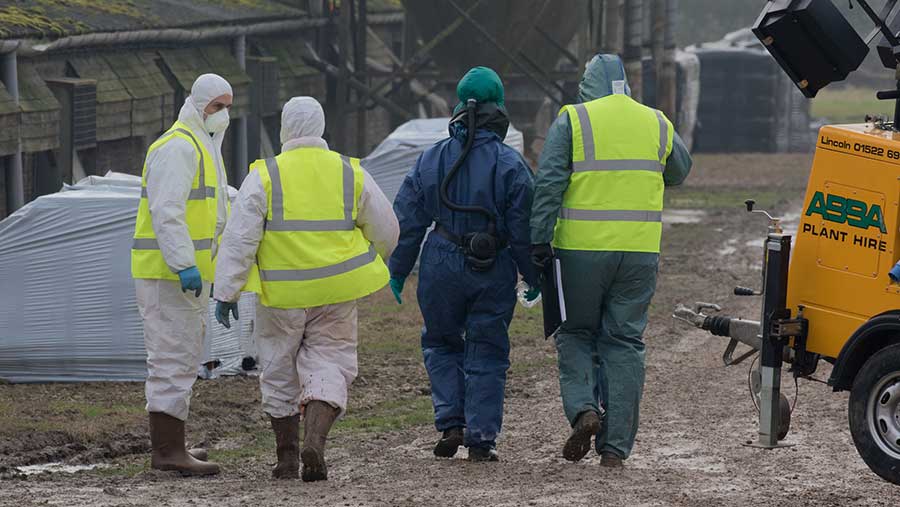Avian flu: Latest Dec 2021 outbreaks and advice
 © Tim Scrivener
© Tim Scrivener Avian influenza H5N1 continues to spread across the UK with nine new cases identified on poultry units in the past week.
Since the start of December, cases have been confirmed in Wales, Northern Ireland, Scotland and on units in the Midlands and north east of England (see box).
The latest outbreaks in England were confirmed on 5 December at sites in North Yorkshire and Gloucestershire.
Scotland’s latest case was in a free-range flock near Gretna, Dumfries and Galloway, on 4 December and veterinary officials in Wales recorded a case near Crickhowell 24 hours earlier.
Meanwhile Northern Ireland reported a case in a backyard flock on 3 December in Broughshane.
See also: Avian influenza prevention tips and how to handle an outbreak
Where are the latest cases
- Thirsk, Hambleton, North Yorkshire (sixth premises): 2 December
- Tutbury, East Staffordshire: 2 December
- Leominster, North Herefordshire: 2 December
- Richmond, Richmondshire, North Yorkshire: 3 December
- Crickhowell, Powys: 3 December
- Broughshane, County Antrim (second premises): 3 December
- Gretna, Dumfriesshire, Dumfries and Galloway: 4 December
- Newent, Forest of Dean, Gloucestershire: 5 December
- Thirsk, Hambleton, North Yorkshire, (seventh premises): 5 December
Prevention and protection measures
All of the birds on the affected farms will be humanely culled in a bid to limit further spread of the disease.
Farms around the latest cases will also come under, 3km-wide protection zones and 10km surveillance zones.
Flock-keepers can check whether their farm lies within a zone via an interactive map on the government’s website.
Further restrictions within the zones affect movements of poultry, carcasses, eggs, litter and manure.
And, as of 8 November 2021, bird gatherings of the following species may no longer take place:
- Galliforme (including pheasants, partridge, quail, chickens, turkey, guinea fowl) birds
- Anseriforme (including ducks, geese, swans) birds.
Flocks across the whole of the UK remain under a housing order, imposed on 29 November.
They must also have strict biosecurity measures in place to ensure birds cannot come into contact with wild birds:
- House or net all poultry and captive birds to keep them separate from wild birds
- Cleanse and disinfect clothing, footwear, equipment and vehicles before and after contact with poultry and captive birds – if practical, use disposable protective clothing
- Reduce the movement of people, vehicles or equipment to and from areas where poultry and captive birds are kept, to minimise contamination from manure, slurry and other products
- Use effective vermin control
- Thoroughly cleanse and disinfect housing on a continuous basis
- Keep fresh disinfectant at the right concentration at all farm and poultry housing entry and exit points
- Make sure all feed and water is not accessible to wild birds.
How to spot avian influenza
Defra has posted images of birds with avian influenza symptoms online.
The main clinical signs of highly pathogenic avian influenza are:
- Sudden and rapid increase in the number of birds found dead
- Swollen head
- Closed and excessively watery eyes
- Lethargy and depression
- Recumbency and unresponsiveness
- Incoordination and loss of balance
- Head and body tremoring
- Drooping of the wings and/or dragging of legs
- Twisting of the head and neck
- Swelling and blue discolouration of comb and wattles
- Haemorrhages on shanks of the legs and under the skin of the neck
- Loss of appetite or marked decrease in feed consumption
- Sudden increase or decrease in water consumption
- Respiratory distress such as gaping (mouth breathing), nasal snicking (coughing sound), sneezing, gurgling or rattling
- Fever or noticeable increase in body temperature
- Discoloured or loose, watery droppings
- Cessation or marked reduction in egg production.
Who to contact
If you find dead swans, geese, ducks or other wild birds, you should report them to the Defra helpline on 03459 33 55 77.
Birdkeepers must report suspicion of disease:
- England: Defra Rural Services Helpline on 03000 200 301
- Wales: 0300 303 8268
- Scotland: Contact the local field services office
- Northern Ireland: 0300 200 7840.
